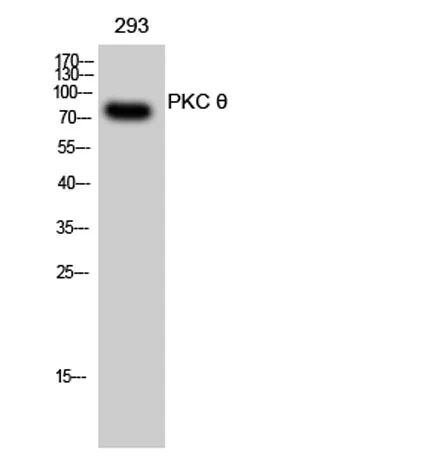PKC θ rabbit pAb
CAT:
855-ES6797-02
Size:
100 μL
Price:
Ask
- Availability: 24/48H Stock Items & 2 to 6 Weeks non Stock Items.
- Dry Ice Shipment: No




PKC θ rabbit pAb
- Description: Protein kinase C (PKC) is a family of serine- and threonine-specific protein kinases that can be activated by calcium and the second messenger diacylglycerol. PKC family members phosphorylate a wide variety of protein targets and are known to be involved in diverse cellular signaling pathways. PKC family members also serve as major receptors for phorbol esters, a class of tumor promoters. Each member of the PKC family has a specific expression profile and is believed to play a distinct role. The protein encoded by this gene is one of the PKC family members. It is a calcium-independent and phospholipid-dependent protein kinase. This kinase is important for T-cell activation. It is required for the activation of the transcription factors NF-kappaB and AP-1, and may link the T cell receptor (TCR) signaling complex to the activation of the transcription factors. [provided by RefSeq, Jul 2008],
- Synonyms: PRKCQ; PRKCT; Protein kinase C theta type; nPKC-theta
- Gene ID: 5588
- UniProt: Q04759
- Cellular Locus: Cytoplasm. Cell membrane; Peripheral membrane protein. In resting T-cells, mostly localized in cytoplasm. In response to TCR stimulation, associates with lipid rafts and then localizes in the immunological synapse.
- Host: Rabbit
- Species Reactivity: Human, Mouse, Rat
- Immunogen: The antiserum was produced against synthesized peptide derived from human PKC thet. AA range:504-553
- Clonality: Polyclonal
- Validated Applications: WB, IHC, IF, ELISA
- Stability: 1 year
- Concentration: 1 mg/mL
- Dilution: Western Blot: 1/500 - 1/2000. Immunohistochemistry: 1/100 - 1/300. ELISA: 1/20000. Not yet tested in other applications.
- Molecular Weight: 78kD
- Storage Conditions: PBS with 0.02% sodium azide and 50% glycerol pH 7.4. Store at -20°C. Avoid repeated freeze-thaw cycles.
